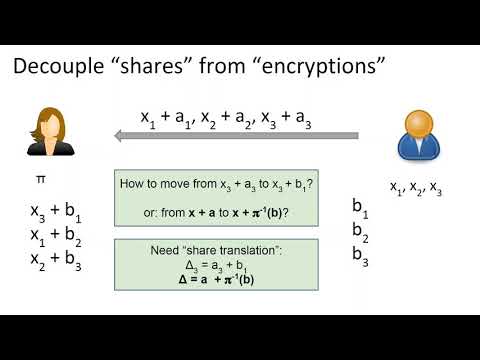CryptoDB
Secret-Shared Shuffle
| Authors: | |
|---|---|
| Download: | |
| Abstract: | Generating additive secret shares of a shuffled dataset - such that neither party knows the order in which it is permuted - is a fundamental building block in many protocols, such as secure collaborative filtering, oblivious sorting, and secure function evaluation on set intersection. Traditional approaches to this problem either involve expensive public-key based crypto or using symmetric crypto on permutation networks. While public-key-based solutions are bandwidth efficient, they are computation-heavy. On the other hand, constructions based on permutation networks are communication-bound, especially when the dataset contains large elements, for e.g., feature vectors in an ML context. We design a new 2-party protocol for this task of computing secret shares of shuffled data, which we refer to as secret-shared shuffle. Our protocol is secure against a static semi-honest adversary. At the heart of our approach is a new primitive we define (which we call ``Share Translation'') that generates two sets of pseudorandom values ``correlated via the permutation''. This allows us to reduce the problem of shuffling the dataset to the problem of shuffling pseudorandom values, which enables optimizations both in computation and communication. We then design a Share Translation protocol based on oblivious transfer and puncturable PRFs. Our final protocol for secret-shared shuffle uses lightweight operations like XOR and PRGs, and in particular doesn't use public-key operations besides the base OTs. As a result, our protocol is concretely more efficient than the existing solutions. In particular, we are two-three orders of magnitude faster than public-key-based approach and one order of magnitude faster compared to the best known symmetric-key approach when the elements are moderately large. |
Video from ASIACRYPT 2020
BibTeX
@article{asiacrypt-2020-30710,
title={Secret-Shared Shuffle},
booktitle={Advances in Cryptology - ASIACRYPT 2020},
publisher={Springer},
doi={10.1007/978-3-030-64840-4_12},
author={Melissa Chase and Esha Ghosh and Oxana Poburinnaya},
year=2020
}

